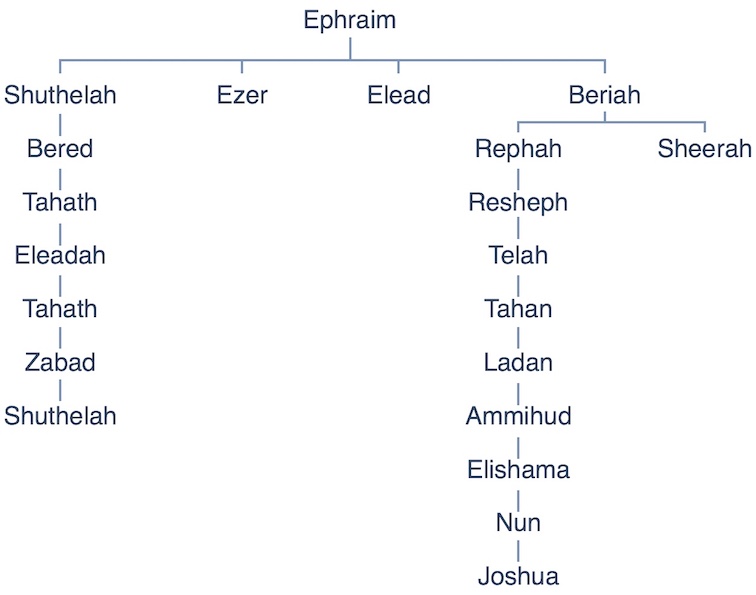Nadene Goldfoot
Jacob was the father of 12 sons. One of them was Ephraim.Ephraim's land included the hill-country in the central region of the land and was noted for its fertility. Mt. Ephraim was the area occupied by the tribe of Ephraim in the hill regions from Bethel northward. At the time of Solomon, the entire region was occupied by Ephraim and Manasseh right in the center of what was later called Palestine. Their later religious center was situated at Shiloh, 25 miles north of Jerusalem in the mountains of Ephraim in its territory.
Jeroboam was the son of Nebat, a member of the Tribe of Ephraim of Zereda. His mother, named Zeruah (צרוע "leprous") was a widow. He had at least two sons, Abijah and Nadab, who succeeded him on the throne.
A massive stepped podium for the Canaanite-Jebusite palace/fortress that was also used as David’s palace. Eilat Mazar dates the building of this structure from the period of 1200-1000 BC. This Stepped Stone Structure was the work of the Jebusites during the days of the Judges, and the work of David around 1000 BCWhile still a young man, King Solomon made Jeroboam superintendent over his tribesmen in the building of the fortress Millo in Jerusalem and of other public works, and he naturally became conversant with the widespread discontent caused by the extravagances which marked the reign of Solomon.
Influenced by the words of the prophet Ahijah, he began to form conspiracies with the view of becoming king of the ten northern tribes; but these were discovered, and he fled to Egypt, where he remained under the protection of Pharaoh Shishak (925 BCE) Egyptian king of Libyan origin until the death of Solomon. Jeroboam fled from Solomon and found refuge with Shishak. In the 5th year of Rehoboam's rule, Shishak overran Judah and plundered the Temple treasure in Jerusalem. His conquests also included the kingdom of Israel. After this event, he returned and participated in a delegation sent to ask the new king Rehoboam to reduce taxes.
After Rehoboam rejected their petition, ten of the tribes withdrew their allegiance to the house of David and proclaimed Jeroboam their king, forming the northern kingdom of Israel (Samaria). Thus, the Civil War. Initially, only the tribes of Judah and Benjamin remained to form the new kingdom of Judah, loyal to Rehoboam.
Gilead was the region of Transjordania, settle by the tribes of Reuben, Gad, and half the tribe of Manasseh (Num.32:Josh.22:9, 15l. After Solomon's reign, Gilead was part of the northern kingdom and, in 732 BCE, was captured by Assyria, its inhabitants being sent into exile. Its boundaries were not stable, and the area has not been precisely determined.
When Moses had died before he arrived in Canaan, dying just outside of it's gates, it was then up of Joshua, his 2nd in command, to issue the sites of land for each of the 12 tribes. 10 tribes were given the northern sites and 2-3 were given the southern sites with Benjamin being in both northern and southern sites.
Jeroboam's distant ancestor no doubt was then Ephraim, the younger son of Joseph which had grown to become the tribe of the Israelite tribe of 9 others in the Northern part of the nation of Israel. Joseph had been Jacob's favorite son. Ephraim's tribe had arrived with 32,500 population after their 40 year trek, but had started off from Egypt with 40,500. They suffered a loss of 8,000. Manasseh, on the other hand, had arrived with 52,700 population, having left Egypt with 32,200. They had a gain of 20,500.
In order to accomplish the building of the temple, his palace, and the other government buildings, Solomon established twelve administrative districts throughout Israel. The purpose of these districts was to provide for the needs the royal court (4:1-19), to raise taxes, and to coordinate the labor force needed to complete the building projects of his kingdom (5:13-18).
According to 1 Kings 9:15, Solomon established a system of forced labor in Israel in order to build “the house of the LORD and his own house, the Millo and the wall of Jerusalem, Hazor, Megiddo, Gezer.” At the beginning of his building projects, forced labor was only imposed on the remnant of the Canaanite population:
“All the people left from the Amorites, Hittites, Perizzites, Hivites and Jebusites (these peoples were not Israelites), that is, their descendants remaining in the land, whom the Israelites could not exterminate–these Solomon conscripted for his slave labor force, as it is to this day” (1 Kings 9:20-21).
According to Deuteronomy 20:11, when the people of Israel entered the land of Canaan, they were supposed to conquer the Canaanites and submit them to forced labor: “If [a Canaanite city] accepts your terms of peace and surrenders to you, then all the people in it shall serve you at forced labor.”
In the period of the Judges, before king Saul, Ephraim claimed priority among the other Israelite tribes, partly because their religious center was situated at Shiloh in its territory.
The secession of the northern tribes after Solomon's death in 920 BCE, centered on the tribe of Ephraim, to which Jeroboam, the first king of the northern kingdom of Israel, belonged.
It's hard to accept that Jeroboam, from such enlightened ancestors, could have ignored his Jewish upbringing and had ignored the principals of it when developing Samaria. Did he do it out of anger? Golden calves? How could he? Is this what seeking power does to a person? Giving up your beliefs?

Resource:
The New Standard Jewish Encyclopedia
https://www.thetorah.com/article/when-moses-placed-ephraim-before-manasseh
https://en.wikipedia.org/wiki/Jeroboam
https://en.wikipedia.org/wiki/Heresy
https://claudemariottini.com/2014/02/18/forced-labor-under-solomon-part-6/
https://www.thetorah.com/article/the-book-of-chronicles-and-the-ephraimites-that-never-went-to-egypt
https://www.generationword.com/jerusalem101/17-millo-jebusite-wall.html
https://biblicalhistoricalcontext.com/quirks-in-chronicles/ezer-elead-and-exodus/

%20%20land%20of%20Ephraim.jpg)

%20ephraim%20before%20manasseh.jpg)



%20Jeroboam's%20golden%20calves%20at%20shilo.jpg)
No comments:
Post a Comment